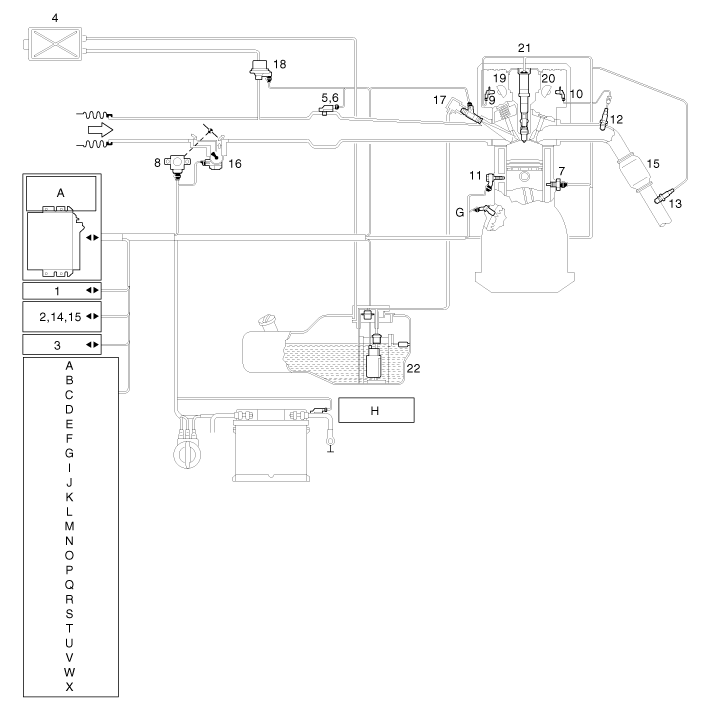Kia Cee'd: Engine Control System / ISG (Idle Stop & Go) Schematic diagrams
Kia Cee'd JD Service Manual / Fuel System / Engine Control System / ISG (Idle Stop & Go) Schematic diagrams
| Schematic Diagram |

| 1. C-CAN
High/Low 2. MIL. Lamp 3. Immobilizer 4. Canister 5. Manifold Absolute Pressure Sensor (MAPS) 6. Intake Air Temperature Sensor (IATS) 7. Engine Coolant Temperature Sensor (ECTS) 8. Throttle Position Sensor (TPS) [integrated into ETC Module] 9. Camshaft Position Sensor (CMPS) [Bank 1 / Intake] 10. Camshaft Position Sensor (CMPS) [Bank 1 / Exhaust] 11. Knock Sensor (KS) 12. Heated Oxygen Sensor (HO2S) [Bank 1 / Sensor 1] 13. Heated Oxygen Sensor (HO2S) [Bank 1 / Sensor 2] 14. Accelerator Position Sensor (APS) 15. A/C Pressure Transducer (APT) 16. ETC Motor [integrated into ETC Module] 17. Injector 18. Purge Control Solenoid Valve (PCSV) 19. CVVT Oil Control Valve (OCV) [Bank 1 / Intake] 20. CVVT Oil Control Valve (OCV) [Bank 1 / Exhaust] 21. Ignition Coil 22. Fuel pump Motor |
A. Cluster
B. Clutch switch C. Neutral switch D. Brake booster vacuum pressure sensor (BBVPS) E. Alternator F. Start motor G. Crankshaft Position Sensor (CKPS) H. Battery sensor I. Hood switch J. Door switch (Driver's) K. Seat belt switch (Driver's) L. DC/DC converter M. Audio N. A/C Control module O. A/C Switch P. Defroster switch Q. A/C Compressor R. Blower motor S. Blower relay T. Evaporator sensor U. Ambient temperature sensor V. Blower resistor [Manual A/C] W. FET (Field Effect Transistor) [Auto A/C] X. Catalytic convertor |
The ISG system is strongly networked with the power management. In the
event of battery replacement, disconnection of the battery terminal
or after changing the engine management system, the reference data regarding
the battery charge state and battery condition can be lost.
They are only available again a closed-circuit current measurement of
approximate 4 hours in which the vehicle may not be wakened. In this
time, the ISG system is inactive.
|
 ISG (Idle Stop & Go) Repair procedures
ISG (Idle Stop & Go) Repair procedures
Inspection
1.
Remove the ISG switch from the switch assembly.
2.
Check the continuity between the switch 3 and 6 terminals as the ISG
...
Other information:
Kia Cee'd JD Service Manual: Components and components location
Components (1)
[General Type]
(5Door)
1. Roof trim
2. Sunvisor [LH]
3. Sunvisor [RH]
4. Retainer
5. Assist handle bracket
Components (2)
[Panoramaroof Type]
(5Door)
...
Kia Cee'd JD Owners Manual: 3. Exhaust emission control
system
The Exhaust Emission Control System is
a highly effective system which controls
exhaust emissions while maintaining
good vehicle performance.
Vehicle modifications
This vehicle should not be modified.
Modification of your vehicle could affect
its performance, safety or durability and
m ...
© 2017-2026 www.kceed.com



